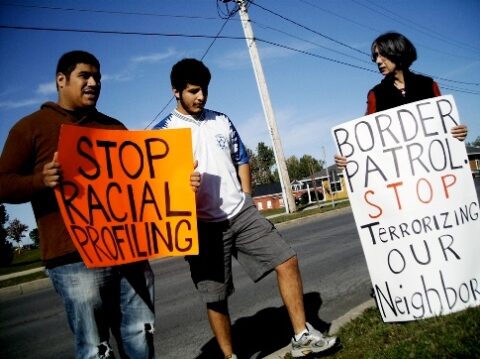(Akiit.com) Director Antoine Fuqua has been chasing the shadow of his biggest hit-to-date, Training Day, for almost a decade. After that breakout success, (for which Denzel Washington won a much-deserved Academy Award for best actor) Fuqua’s subsequent films have disappointed either commercially (King Arthur), critically (Shooter) or both (Tears of the Sun). With his latest, Brooklyn’s Finest (which opens Friday, March 5), Fuqua is finally back in his comfort zone–the police thriller–and although this work doesn’t come close to surpassing Denzel’s classic–it is at times a worthy successor.
Working off a script by first time writer Michael C. Martin, Fuqua weaves three stories of three veteran cops–one retiring (Richard Gere), one undercover (Don Cheadle) and another hopelessly corrupt (Ethan Hawke)–all based in Brooklyn. The common thread all three men share besides location is that while they are all inherently decent men they are also morally compromised and challenged in one way or another.
From the opening shot until the final frame–this film grabs you. It’s beautifully shot (on location in Brooklyn) and once they get going each one of the main storylines manages to really hold your interest and build in tension. Gere’s Eddie Duggan is lonely, suicidal and derided by his fellow officers as a “burnout“. He is forced to mentor unreliable rookie officers during his last week on the job. When all he wants is to be left alone, Gere’s character keeps being drawn back into perilous situations. Hawke’s Sal is struggling to make ends meet with a sick wife pregnant with twins and several other children to provide for. He finds himself stealing drug money to finance a new home. Finally there’s Don Cheadle who has taken on the alter-ego “Tango” and has gone deep undercover to help bring down a drug kingpin named Caz (played by Wesley Snipes) who has recently been released from prison. His eagerness to attain promotion within the police department has isolated him from not just his colleagues but from his family as well.
While the film is never boring, Fuqua takes a lot of time to set up his three protagonists. This is a good thing. He is aiming for the film to be a parable about flawed men forced to make difficult choices and there are a lot of religious overtones–from a darkly funny confessional scene featuring Hawke to a cameo from a black Jesus–but it’s the pulse pounding, cross-cutting suspense sequences that keep you on the edge of your seat.
The threat of violence seems to hang over every scene–and I mean that as a compliment. When action does erupt it’s raw and almost always authentic. One police raid in particular led by Hawke’s character is so rough and tumble it almost plays like documentary footage. When bullets hit in this film, (and they do often), they hit hard and the grip this film has on the jugular never loosens even when some of the plot threads do.
The cast is uniformly excellent. Although his plotline is the weakest of the three, Gere has a gravitas and quiet dignity in this film that is revelatory. In Hawke’s case, age has done wonders for him. He’s craggier and less boyish, a decade ago his presence in a film like this would be suspect at best–but now that he’s lost his teen idol looks he has a dangerous edge to him that is appealing to watch. He isn’t afraid to be unlikable onscreen.
Still, it’s Cheadle who makes the strongest impression and gives the film’s most charismatic performance. He is the kind of actor who just projects fierce intelligence. Whether he’s playing the role of a hard gangster to persuade Snipes’ crew that he is legit or pleading with his superiors to be removed from undercover work, Cheadle’s performance as “Tango” is riveting. His scenes with Wesley Snipes may just be the acting highlight of the film. For Snipes this is a comeback of sorts–legal woes and poor role choices had recently threatened to make him a permanent Hollywood punchline. But he shrewdly accepted this solid supporting role and brilliantly underplays it. Snipes reminds us why he is a star. He has a hilarious monologue where he compares the methods of Dominican, Colombian and Mexican drug lords that is time-capsule worthy.
This is not to say the film doesn’t have its flaws. There is no denying that it treads some very familiar, clichéd ground. We’ve seen films about old cops saddled with green rookies before. We’ve seen movies about undercover officers who have gotten too close to suspects before. We’ve seen films about cops on the take, cops on the make and cops who are about to break. Still, this film has enough energy, humor and pure adrenaline that you might look past the occasionally conventional tropes that it unabashedly embraces.
The movie hardly has a subtle moment and the women in the film are mostly either whores, victims or, in the case of a gleefully over-the-top Ellen Barkin as Cheadle’s superior, merciless ball-breakers. A subplot involving Gere and a hooker with a heart of gold is woefully undercooked and occasionally uncomfortable to watch. Plus the final act is bogged down with enough convenient plot contrivances to make the writers of Crash blush.
It’s an extremely bloody, sensationalistic movie that’s probably not as epic as it would like to be–but nevertheless I admire its ambition. As a piece of entertainment it’s first-rate but as food for thought it falls short. If you’re a fan of this testosterone-infused genre, this movie delivers. Just don’t think about it too much after you leave the theater.
Written By Adam Howard










Leave a Reply